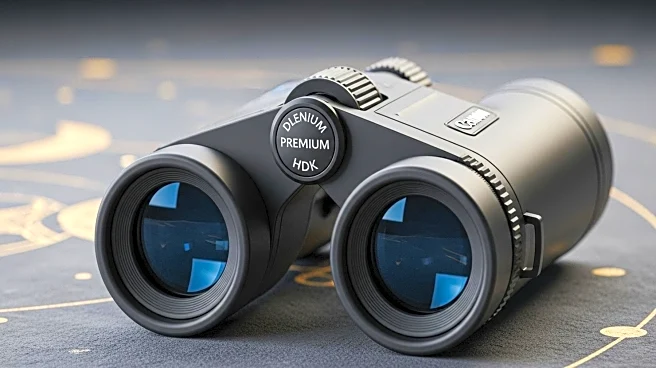What's Happening?
The Celestron SkyMaster 25x100mm binoculars, renowned for their high magnification capabilities, are now available at a reduced price for Labor Day. Amazon has discounted these binoculars by 22%, bringing the price down to $403.69 from the usual $519.95. This marks the lowest price since January, offering a significant saving of $116.23. The binoculars are praised for their ability to deliver detailed views of the night sky, including galaxy clusters and planetary features. However, they are noted for their weight, requiring a tripod for stable viewing. The binoculars feature 25x magnification, 100mm objective diameter, and BaK-4 prisms, and are water-resistant, though not fully waterproof.
Why It's Important?
This discount on the Celestron SkyMaster binoculars is significant for astronomy enthusiasts and hobbyists looking to enhance their sky-watching experience. The binoculars' high magnification allows users to observe celestial objects in greater detail, making them a valuable tool for amateur astronomers. The price reduction makes these binoculars more accessible, potentially increasing interest in astronomy and sky-watching activities. Retailers like Walmart and B&H Photo are matching Amazon's price, indicating competitive pricing strategies in the market for high-quality optical equipment.
What's Next?
As the Labor Day sale continues, consumers may see further discounts on related astronomy equipment, such as tripods and telescopes. The reduced price may encourage more purchases, leading to increased demand for accessories that complement the binoculars. Retailers might respond by offering bundled deals or additional discounts on complementary products. Astronomy clubs and educational institutions could leverage this opportunity to acquire equipment for educational purposes, potentially fostering greater interest in astronomy among students and the public.
Beyond the Headlines
The sale of high-quality binoculars at a reduced price may have broader implications for the optics industry, encouraging manufacturers to innovate and offer competitive pricing. This could lead to advancements in optical technology and increased accessibility for consumers. Additionally, the promotion of sky-watching activities may contribute to a greater appreciation for science and nature, influencing cultural attitudes towards astronomy and environmental awareness.











